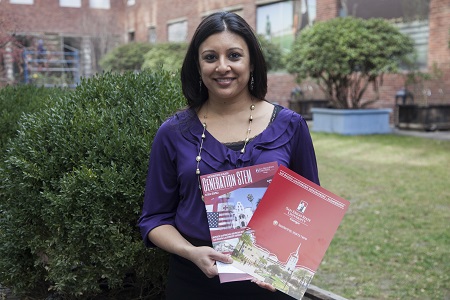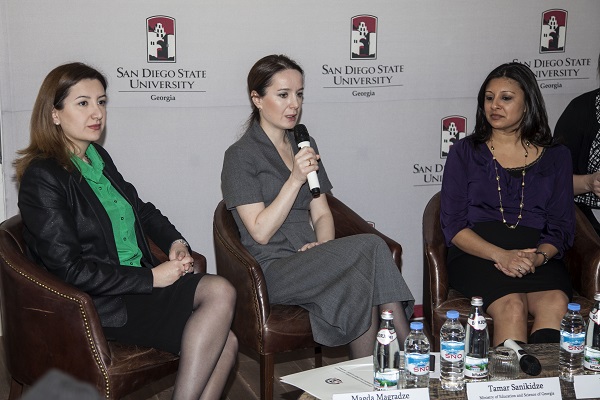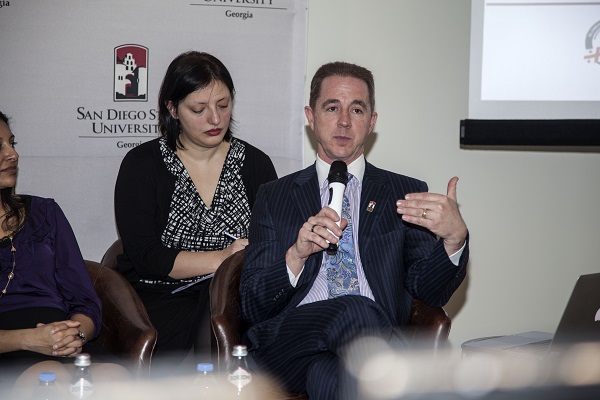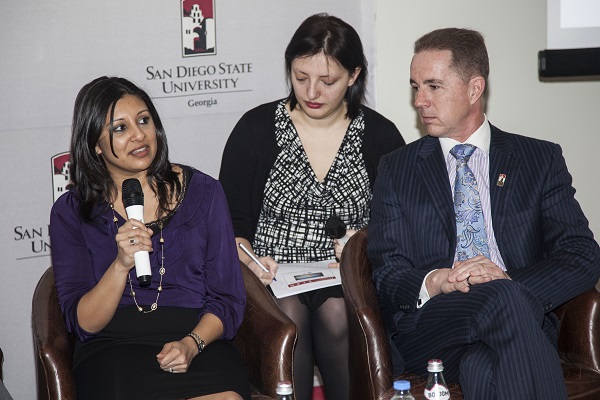Millennium Challenge Corporation: Georgia needs STEM specialists to reinvent its economy


Georgian students are being given more opportunities to receive an American education without leaving their home country.
On February 5 San Diego State University (SDSU) Georgia presented its early admission program APPLY SDSU, and invited students to apply for the upcoming semester.
Qualified students who apply during the early admission period of February 15-March 15 will be conditionally accepted by SDSU and will automatically receive partial scholarships from the University to earn American degrees in engineering, technology and natural sciences (STEM fields).

San Diego State University students in Georgia with the University Dean and Georgia's Minister of Education. Photo by N.Alavidze/Agenda.ge.
Last week the University announced a new Bachelor of Science (BS) program in Computer Sciences would begin. The new program will be added to the existing BS programs in Computer Engineering, Electrical Engineering and Chemistry/Biochemistry.
Within this program Georgian students will have the chance to go to the United States (US) and continue their studies for one semester or a full year at the SDSU California campus. Degree programs were offered in cooperation with three partner Georgian State Universities: Tbilisi State University, Ilia State University and Georgian Technical University.

SDSU Degree programs are offered in cooperation with three partner Georgian State Universities: Tbilisi State University, Ilia State University and Georgian Technical University. Photo by N.Alavidze/Agenda.ge.
What are SDSU Bachelor’s degree programs?
The SDSU Bachelor’s degree programs in Georgia are designed to enable students to earn American degrees in STEM fields.
$29 million USD has been allocated to enhancing higher education in Georgia. This money was part of a pool of funds worth $140 million that the US government is providing in aid to Georgia through Georgia’s compact with the Millennium Challenge Corporation (MCC).
The compact is implemented by the Millennium Challenge Account – Georgia (MCA-Georgia) in the fields of general, vocational and higher education. The Compact is the largest investment in Georgia’s education sector to date, and is structured to develop Georgia’s human capacity for economic growth.

Georgia's Minister of Education Tamar Sanikidze spoke about the importance of developing of STEM directions. Photo by N.Alavidze/Agenda.ge.
How long will SDSU stay in Georgia?
As Dr. Ken Walsh, Dean of SDSU Georgia told Agenda.ge, students who are enrolled in the programs are selected in line with their National Exam scores; scores for skills and English language are areas the University focused on.
The total cost of study [per person] is $7,000 annually. However the studies for socially vulnerable students are totally financed. Others have serious chances to gain partial scholarships, taking their scores into account,” he said.
Walsh also told Agenda.ge that SDSU had a deal with Georgia’s Ministry of Education to remain in Georgia for 20 years.

Dr. Ken Walsh, Dean of SDSU Georgia told Agenda.ge that they accept 500 Georgian students annually. Photo by N.Alavidze/Agenda.ge.
We are happy to be here, as Georgian students are very smart and it is nice to work with them,” Walsh said.
Process of implementing of the compact
MCA CEO Magda Magradze told Agenda.ge the Millennium Challenge Account – Georgia was responsible for monitoring locally how the funds allocated by the US MCC were being spent.
We draft reports and monitor the situation. Once a year we are visited by US representatives who familiarise themselves with the situation here. [Our agency’s performance] will specify what type of feedback Georgia receives once the Compact has ended,” Magradze said.
Georgia began implementing its first $395 million US MCC Compact in 2007 and this finished in 2011. The first Compact was mainly focused on infrastructural development.
Georgia gained its second Compact, worth $140 million, in 2013 for education. From this money, over five years $76 million will be spent on general education, $16 million on vocational education and $30 million on higher education.
Agenda.ge interviewed MCC Regional Deputy Vice President for Europe, Asia, the Pacific and Latin America Fatema Sumar, and discussed Georgia’s educational challenges and future prospects of Georgia-US cooperation.

Fatema Sumar said each country required continual innovation in its education system. Photo by N.Alavidze/Agenda.ge.
Q: What do you believe are the major challenges of the Georgian education system?
A: The Georgian economy is looking for ways to reinvent itself. It is looking for a skilled workforce to meet the existing demands of the 21st Century. Many international and local companies are based here [and] they are in need of professionals especially in the fields of science, technology, economy and mathematics. Actually they are unable to find enough local qualified people in these areas. Too often they have to import skilled people to meet workforce needs here in Georgia. The main idea of the Georgian–MCC partnership is to build the capacity and produce a qualified workforce for future generations in Georgia. We are rehabilitating schools, establishing labs and invest in such fields so Georgian youth can have good opportunities to study.
Q: Why do you think it has been hard for Georgia to produce professionals, especially in the STEM direction?
A: Each country requires continual innovations in its education system for its economy to develop. There were not enough investments in education for Georgia to produce competitive staff.
Q: The MCC decided to allocate $76 million out of $140 million for general education. Why was this direction such a priority for you?
A: All educational components are critical but you should start early, should give quality education at the lower lever for a person to have relevant stills when he or she decides to get a higher education. Many schools in Georgia are in desperate need of rehabilitation, renewed curriculums, teacher trainings, modern technologies. The $76 million USD will address many of these needs. Students who have a good foundation of secondary education, meaning necessary knowledge of subjects, languages and so on, they can be competitive in higher and vocational education institutions.
Q: How much time will it need for Georgia to catch up with developed countries’ educational levels?
A: This is an ongoing problem; many countries are currently facing the same situation. The more steps the government, the civil sector and private sector take, more the process will speed up. Such cooperation is essential. All stakeholders should be very actively involved. It will be a long-term partnership. It will take at least a generation to help create a lasting, sustainable change we want to see in Georgia but changes start today and we will have results tomorrow.
Q: How do you monitor the money you allocate for Georgia to be appropriately spent?
A: The project has a very unique feature. Georgians are responsible for the money the United States allocates to them. We are closely cooperating with our representatives here in this regard.
Q: Is it possible a country can receive a Compact for a third time?
A: Well the MCC is very young, just 11 years old and Georgia has already gained Compacts two times, each of them covered five years. We will observe how successfully Georgia fulfills its obligations when the second Compact expires. Let’s see, only time will tell.
 Tweet
Tweet  Share
Share
